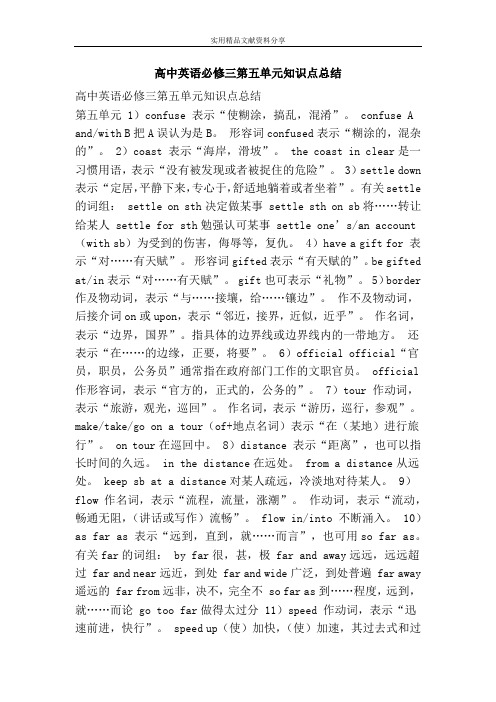必修三unit5语法
- 格式:pptx
- 大小:49.92 KB
- 文档页数:10


Unit 5 The Value of Money 知识点精讲一、词汇精讲1. basis n.[pl. bases]基础;基点;根据教材原句Is money the basis of a happy life?金钱是幸福生活的基础吗?常用搭配:--on the basis of sth在某事的基础上;根据某事e.g. She was chosen for the job (on the basis of her qualifications.她因资历适合而获选中担任这项工作。
联想词:base n.基础;基地;根据vt,以……为基地be based on...以……为基础e.g. Rapid development of the economy should be based on science, technology and education.经济的快速发展应该以科技和教育为基础。
2. apologise vi.道歉;谢罪教材原句Wang Zheng apologised to Chen because he couldn't offer her more money.王政向陈道歉,因为他不能给她更多的钱。
常用搭配:apologise to sb for (doing) sth=say sorry to sb for (doing) sth因(做)某事向某人道歉e.g. The captain apologised to the passengers for the delay caused by the weather.机长因天气状况引起的(航班)延误向乘客道歉。
联想词:apology n.道歉make an apology to sb for sth因某事向某人道歉owe sb an apology应向某人道歉accept/refuse one's apology接受/拒绝某人的道歉e.g. He wanted the defendant to make a public apology through the media, and pay $150 as compensation for mental injury.他希望被告通过媒体作出公开道歉,并支付150美元作为精神损害赔偿金。

Section ⅡListening and Speaking&Reading and Thinking——Language Points1.basis n.基础;根据;基点→basic adj.基本的;基础的→base n.基础,基地2.apologise v i道歉;谢罪→apology n.道歉;认错3.ignore v i.忽视;对……不予理会ignorant adj.无知的;不知道的→ignorance n.无知;愚昧4.judge v t.&v i.评价;评判;判断n.法官;审判员;裁判员→judgement n.判断;审判;判断力5.narrator n.(书、戏剧或电影中的)叙述者,讲述者;(电视节目中的)幕后解说员→narration n.叙述;讲述;解说6.mining n.采矿;采矿业→mine n.矿;矿业→miner n.矿工7.patience n.耐心;忍耐力;毅力→patient adj.忍耐的,有耐心的→patiently ad v.忍耐地;有耐心地8.indicate v t.&v i.表明;显示v t.象征;暗示→indication n.表明,暗示;预兆;说明9.odd adj.奇怪的;怪异的,反常的→oddly 奇怪地,怪异地→oddness 奇怪;奇妙1.judge v t.&v i.评价;评判;判断n.法官;审判员;裁判员①His father is a fair judge.法官②They were the judges at the flower show.评判员③A man should be judged by his deeds,not his words.判断④He was judged innocent.判决2.bet n.打赌;赌注v i.&v t.下赌注;用……打赌v t.敢说①He bet $2,000 on the final score of the game.用……打赌②I bet that you are too late.敢说③We've got a bet on who's going to arrive first.打赌3.spot v t.看见;注意到;发现n.地点;处所;斑点;污迹①The leopard has spots all over its body.斑点②His jacket was covered with spots of mud.污迹③He likes to live on the lonely spot in the small island.地点;场所④I finally spotted my friend in the crowd.发现;注意到Words And Phrases知识要点1apologise/apologize vi.道歉;谢罪(教材P50)Wang Zheng apologised to Chen because he couldn't offer her more money.王真因为不能给陈更多的钱而向她道歉。


知识总结:Unit5 语言点详解目标认知重点词汇slightly, border, scenery,surround,measure,aboard,settle,manage,within,confirm,around,distance,downtown,approximately,impress重点短语catch sight of,rather than,as well as,have a gift for,as far as,look over重点句型“代词+现在分词”构成的独立主格结构“not… until…”句式知识讲解重点词汇slightly重点例句:…, and that Canada’s population is only slightly over thirty million, but now they were amazed to see such an empty country.slightly (adv.)轻微地;稍微①The number of passengers by this line fell off slightly in January.一月份这条航线的乘客数量略有减少。
②This one is slightly better than that.这一个比那个稍好一点。
●用法拓展slight (adj.)微小的,轻微的,微不足道的;不结实的,纤弱的;脆弱的①I have a slight cold.我患了轻微的感冒。
②The wind seemed to lift her slight body.风似乎要把她瘦弱的身体吹起来。
border重点例句:At school, they had learned that most Canadians live within a few hundred kilometres of the USA border,…border(n.)边界;国界;边沿(vt.&vi.)与……接壤;接近●用法拓展a border town边境城市the border of the lake湖边on the border of将要;接近于;在……的边界上border on sth.接近某物,毗邻某物;几乎与……接近;近似●易混辨析border, boundary, frontierborder“边境,边界”,常指沿两国边界的地区。

高中英语必修三第五单元知识点总结高中英语必修三第五单元知识点总结第五单元 1)confuse 表示“使糊涂,搞乱,混淆”。
confuse A and/with B把A误认为是B。
形容词confused表示“糊涂的,混杂的”。
2)coast 表示“海岸,滑坡”。
the coast in clear是一习惯用语,表示“没有被发现或者被捉住的危险”。
3)settle down 表示“定居,平静下来,专心于,舒适地躺着或者坐着”。
有关settle 的词组: settle on sth决定做某事 settle sth on sb将……转让给某人 settle for sth勉强认可某事settle one’s/an account (with sb)为受到的伤害,侮辱等,复仇。
4)have a gift for 表示“对……有天赋”。
形容词gifted表示“有天赋的”。
be gifted at/in表示“对……有天赋”。
gift也可表示“礼物”。
5)border 作及物动词,表示“与……接壤,给……镶边”。
作不及物动词,后接介词on或upon,表示“邻近,接界,近似,近乎”。
作名词,表示“边界,国界”。
指具体的边界线或边界线内的一带地方。
还表示“在……的边缘,正要,将要”。
6)official official“官员,职员,公务员”通常指在政府部门工作的文职官员。
official 作形容词,表示“官方的,正式的,公务的”。
7)tour 作动词,表示“旅游,观光,巡回”。
作名词,表示“游历,巡行,参观”。
make/take/go on a tour(of+地点名词)表示“在(某地)进行旅行”。
on tour在巡回中。
8)distance 表示“距离”,也可以指长时间的久远。
in the distance在远处。
from a distance从远处。
keep sb at a distance对某人疏远,冷淡地对待某人。
人教版高中英语必修三Unit 5 Canada —“The True North”知识点1.重点词汇1. chat vi.&n. 聊天;闲聊[典例]1). What were you chatting to him about?2). I had a long chat with her (about her job).[重点用法]chat to/with sb (about sth) = have a chat with sb (about sth) 与某人聊天、闲谈……2. eastward adv. 向东adj. 向东的;朝东的[典例]1). They were traveling eastward(s) to the city which appeared in their dreams. 他们朝着东边向梦想中的城市进发。
2). The plane flied in an eastward direction.[词语归纳]eastward(s) adj./adv. 向东的,向东地westward(s) adj./adv. 向西的,向西地southward(s) adj./adv. 向南的,向南地northward(s) adj./adv. 向北的,向北地southeastward(s) adj./adv. 向东南的,向东南地northeastward(s) adj./adv. 向东北的,向东北地southwestward(s) adj./adv. 向西南的,向西南地northwestward(s) adj./adv. 向东北的,向东北地3. surround vt.&vi. 包围;围绕surrounding adj. 周围的surroundings (常用pl.)环境[典例]1). Trees surround the pond.2). The house was surrounded by high walls.[重点用法]surround...with... 用……包围…… be surrounded by/with... 周围都是……4. measure vi.&vt. 测量;衡量;判定n.[c,u] 尺寸;量具;计量单位;措施[典例]1。
新人教版B3U5 The Value of Money Section1 Listening and Speaking1.attitudes towards money对钱的态度2.lead a good life过美好的生活3.the basis of...的基础4.return sth. to sb.将某物归还5.apologize to sb.向某人道歉6.take out a large loan取得贷款7.set up a fundraising website建立一个筹钱网址8.on the basis of以...为基础9.It is common for people to do sth.做某事很正常10.b ased on...以...为基础11.g et... in return得到...作为回报12.r efuse to do sth.拒绝做某事Section2 Reading and Thinking13.m ake a bet打赌14.a s a matter of fact事实上15.b y accident偶然地,意外地16.b e spotted by a ship被一艘船发现17.s eek help寻求帮助18.t o be honest老实说19.o ught to do sth.应该做某事20.b e about to do sth.即将做某事21.h ave a heated argument展开热烈的争论22.p ostpone doing sth.推迟做某事Section3 Discovering Useful Structures23.b e stuck in被困在24.i n case以防万一25.m ost importantly更重要的是26.t o some extent在一定程度上27.p ursue one’s dream of doing sth.追求梦想28.o n duty值班,值勤29.g et into trouble陷入麻烦中Section4 Viewing and Talking30.h esitate to do sth.犹豫做某事31.p ay the bill支付账单32.t o one’s surprise令某人惊讶的是Section5 Reading for Writing33.i n a rude manner粗鲁的举止34.i n that case既然那样的话35.b e willing to do sth.乐意做某事36.f ace difficulties面对困难Section6 Assessing Your Progress/project/video37.a n upper-class party上流社会的晚会38.m aintain a good relationship with保持友好关系39.D on’t judge a book by its cover.不以貌取人40.r emind sb. to do sth.提醒某人做某事词形变化1. apologise vi.道歉;谢罪→apology n.道歉2. ignore vt.忽视;对……不予理会→ignorance n.无知;愚昧→ignorant adj.无知的;愚昧的3. judge vt.&vi.评价;评判;判断n.法官;审判员;裁判员→judgement n.判断4. servant n.仆人;用人→serve v.服务5. sail vi.& vt.(船)航行;(人)乘船航行→sailing n.航行→sailor n.水手6. patience n.耐心;忍耐力;毅力→patient adj.耐心的n.病人7. indicate vt. & vi.表明;显示vt.象征;暗示→indication n.表明;显示8. hesitate vi.犹豫;迟疑;顾虑→hesitation n.犹豫;迟疑9. option n.可选择的事物;选择;选择权→optional adj.可选择的10. normal adj.典型的;正常的;一般的;精神正常的n.常态;通常标准;一般水平→normally adv.通常11. permission n.准许;许可;批准;许可证→permit vt.&vi.允许;准许;使有可能12. intention n.打算;计划;意图;目的→intend v.打算;计划Section1 Listening and Speaking41.__________________________对钱的态度42.________________________过美好的生活43.__________________________.的基础44.__________________________将某物归还45.__________________________向某人道歉46.__________________________取得贷款47.__________________________建立一个筹钱网址48._________________________以...为基础49.________________________做某事很正常50.__________________________以...为基础51.______________________得到...作为回报52.__________________________拒绝做某事Section2 Reading and Thinking53.__________________________打赌54.__________________________事实上55.__________________________偶然地,意外地56.________________________被一艘船发现57.__________________________寻求帮助58.__________________________老实说59.__________________________应该做某事60.__________________________即将做某事61.______________________展开热烈的争论62.__________________________推迟做某事Section3 Discovering Useful Structures63.__________________________被困在64.__________________________以防万一65.__________________________更重要的是66.__________________________在一定程度上67.__________________________追求梦想68.__________________________值班,值勤69.__________________________陷入麻烦中Section4 Viewing and Talking70.__________________________犹豫做某事71.__________________________支付账单72.__________________________令某人惊讶的是Section5 Reading for Writing73.__________________________粗鲁的举止74.__________________________既然那样的话75.__________________________乐意做某事76.__________________________面对困难Section6 Assessing Your Progress/project/video77.__________________________上流社会的晚会78.__________________________保持友好关系79.__________________________不以貌取人80.__________________________提醒某人做某事词形变化1. __________________ vi.道歉;谢罪→__________________ n.道歉2. __________________ vt.忽视;对……不予理会→__________________n.无知;愚昧→__________________adj.无知的;愚昧的3.__________________vt.&vi.评价;评判;判断n.法官;审判员;裁判员→__________________ n.判断4.__________________ n.仆人;用人→__________________ v.服务5. __________________vi.& vt.(船)航行;(人)乘船航行→__________________ n.航行→__________________n.水手6. __________________n.耐心;忍耐力;毅力→__________________ adj.耐心的n.病人7. __________________ vt. & vi.表明;显示vt.象征;暗示→__________________ n.表明;显示8. __________________ vi.犹豫;迟疑;顾虑→__________________ n.犹豫;迟疑9. __________________ n.可选择的事物;选择;选择权→__________________adj.可选择的10.__________________ adj.典型的;正常的;一般的;精神正常的n.常态;通常标准;一般水平→__________________ adv.通常11. __________________ n.准许;许可;批准;许可证→__________________vt.&vi.允许;准许;使有可能12. __________________n.打算;计划;意图;目的→__________________v.打算;计划。
Unit5 定语从句【2019人教版高中英语选择性必修三语法知识】Unit5 Poems定语从句是由关系代词或关系副词等引导的从句,其作用是作定语修饰主句的某个名词或代词,有时也可用来说明整个主句或主句的一部分,相当于形容词。
定语从句的三要素:先行词、关系词、关系词在从句中作某种成分。
1.定语从句的分类(1)限制性定语从句对先行词起修饰和限定的作用,如果把它去掉,主句就不能表达明确的含义,先行词与关系词之间不用逗号隔开。
People who take physical exercise usually live longer.进行体育锻炼的人通常更长寿。
(若把从句去掉,主句就失去了意义)(2)非限制性定语从句对先行词或主句起补充说明作用,把它去掉后,主句的意义仍完整且不受影响,常用逗号与先行词或主句隔开。
His daughter, who is in Boston now, is coming home next week.他的女儿现在在波士顿,下个星期回来。
(若把从句去掉,主句意义仍然完整)2.关系代词引导定语从句定语从句中,常用的关系代词有that, which, who, whom, whose , as.(1)指人: who,whomThis is the stranger who helped us today.这就是那位今天帮助过我们的陌生人。
Lily is the person with whom I am working.莉莉是同我一起工作的人。
(2)指物:whichIt was a prison from which no one escaped.那是一座任何人都逃不出去的监狱。
Julie is good at German, French and Russian, all of which she speaks fluently.朱莉擅长德语、法语和俄语,这些语言她都说得很流利。
Unit5 The Value of Money重点1情态动词的基本用法教材原句①Oliver believes that with a millionpound banknote a man could live a month in London.奥利弗相信,一个人靠一张一百万英镑的钞票可以在伦敦生活一个月。
(could表示推测,意为“可能”)[P52]②If you don't mind, may I ask you how much money you have?如果你不介意的话,我可以问一下你有多少钱吗?(may用于疑问句,表示提出请求)[P52]③Well,it may seem lucky to you but not to me!嗯,对你来说可能很幸运,但对我来说不是!(may表示推测,意为“可能”)[P52]④Young man, would you step inside a moment,please?年轻人,能请你进来一下吗?(would 表示谦恭的请求)[P52]⑤Well,you mustn’t worry about that.嗯,你一定不要为此担心。
(mustn’t表示禁止,意为“千万不要”)[P52]⑥Now if you'll excuse me, I ought to be on my way.现在请你原谅,我该走了。
(will表意愿;ought to 表示理应做的事)[P52]⑦I dare not buy all these things.我不敢把这些东西都买了。
(dare表示“敢;敢于”)[P56]情态动词表示说话人对某一动作或状态的态度,具有词义,但意义不够完整,不能单独作谓语。
情态动词基本没有人称和数的变化,后面要接动词原形。
常见的情态动词有:can/could、may/might、will/would、shall/should、ought to、must、need、dare、used to等。